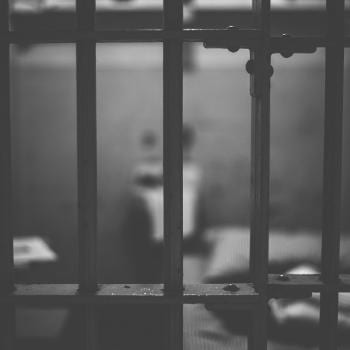Some 3 out of every 4 inmates in Illinois prisons are black, yet, an Illinois prison banned an inmate education program from using books discussing black history or empowerment due to their “racial” content.
A Chicago Tribune investigation found that:
Officials at an Illinois prison suspended an educational program for inmates, launched two internal investigations and removed 200 books from a prison library because many had “racial” content or addressed issues like diversity and inclusion, according to records obtained by the Tribune.
Danville Correctional Center officials also prohibited for use in the University of Illinois program several classic books of African American history, including “The Souls of Black Folk,” the anti-slavery novel “Uncle Tom’s Cabin” and the memoir of former slave and abolitionist Frederick Douglass.
As I read this story, I was struck again by the wrongness of our criminal justice system. It’s not just injustice—racial disparities in sentencing, say. It’s also that our criminal justice system is ineffective, with its focus on punishment rather than rehabilitation, and all the money we pour into locking people up rather than truly applying ourselves to prevention; inhumane, with dehumanizing strip searches and brutality by guards and between inmates; and, well, this.
God forbid these predominantly black inmates learn the history of their own people. What, are the guards afraid the inmates will be angry if they learn about slavery? Guess what? They may be able to dictate the minutia of the lives of their inmates, but they don’t get to dictate what happened in our past. They do not have the power to change our nation’s history because it’s inconvenient.
I’m reminded of Native American boarding schools, where children were stripped of their culture and denied access to their language, their stories, their past. It wouldn’t surprise me in the least to learn that libraries in Japanese internment camps—if they had them at all—were stripped of Japanese language books, or other books portraying Japanese history or culture.
Denying a person access to information about their culture and their people’s history should be a civil rights violation, regardless of whether that person is interned.
With this commentary out of the way, let’s look at the details of what happened in this case. The education program, the Education Justice Project (EJP), was run by the University of Illinois, and offered inmates for-credit courses in a variety of subjects, operating out of space in the prison facility. The Chicago Tribune article describes a cascading situation in which the prison cracked down on the program for trumped-up reasons, conducting one internal investigation after another.
In November, EJP submitted for review a list of books to be used in coursework the following semester.
EJP submitted 25 books for approval. Of those, four were denied outright, nine were allowed in for review but then denied and 12 were approved. Among the books not allowed in for review was “The Color of Law: A Forgotten History of How Our Government Segregated America.” Books denied after review for the spring semester deal largely with race and social issues, including “Uncle Tom’s Cabin” by Harriet Beecher Stowe and “Incidents in the Life of a Slave Girl” by Harriet Jacobs, both written in the 1800s.
Meanwhile, Mark Twain’s The Adventures of Huckleberry Finn and Thomas Jefferson’s Notes on the State of Virginia were approved.
Around the time the course materials were denied, prison officials found rule violations connected to the program, the records show: A printout of an email about “racial disparity problems within the EJP program” was found in an inmate’s cell, [EJP program director Rebecca] Ginsburg attempted to bring a memory card into the prison and someone attempted to mail photos of an EJP ceremony, taken from Ginsburg’s Flickr account, to an inmate.
Prison officials opened an internal affairs investigation.
Ginsburg told prison officials that she’d been allowed to bring the memory card into the office to store it before—which is what she was doing—and that she’d posted photos of EJP events for years without anyone saying anything. Nevertheless, the investigation was still ongoing on January 10th, when EJP staff brought approved materials in for the spring semester.
Despite a December memo from an assistant warden to the prison’s main gate listing materials “approved” to be brought in on Jan. 10, the same assistant warden then indicated the materials needed to be screened again….
[I]t was during that review that prison officials said they found readers “that contained numerous racial issues,” including “cartoons that were racially motivated,” according to the documents. That prompted officials to check other materials already inside EJP’s resource room, where it was discovered there were “several racially motivated books, a book on the Hell’s Angels and books of anime pornography,” according to an email sent the following day by a corrections lieutenant to the warden.
The memo also noted the EJP handbook “contained an entire section about Diversity and Inclusion … which is an issue that is currently under investigation.”
The mention of anime pornography sounds like a ridiculous nothing blown out of proportion for effect. In all likelihood a staff member brought in a completely innocuous anime book for personal reading, for example, and prison officials chose to term its artwork “pornography,” as one does. Or perhaps it was anime text used in the program, which, again, they decided to classify as pornography. Or maybe it was anime pornography, and had been hidden there by inmates.
In case it’s not obvious, I’m not assuming good faith from these prison official. They banned a prison education program from assigning Uncle Tom’s Cabin because of it has “racial” themes, for god’s sake. These officials aren’t interested in operated in good faith.
Returning to the list of objections materials found in the EJP resource room, I want to know the title of the “racially motivated” book they found. It’s probably something like Michelle Alexander’s The New Jim Crow, which has been banned from prisons across the country. It’s almost like white people want to be able to create gross inequality through systems that perpetuate prejudice without black people ever finding out about it, because they might get angry. It’s an attempt at coverup.
As for the book about the Hell’s Angels, come on. Unless it was a recruitment pamphlet, I don’t see what the issue is. It’s almost like learning about things is being treated as de facto suspect here.
Regardless, having found these materials in the EJP resource room during a completely spurious added screening process, prison officials announced on January 11 that they were canceling all EJP courses indefinitely. Meanwhile, they stepped up their investigation of EJP.
Later that month, the warden also directed staff members to remove from the EJP resource room “any books/items of a controversial nature to be reviewed further.” About 200 items were removed, most of which had themes around race or incarceration, including “Race Matters” by Cornell West, “Colored People: A Memoir” by Henry Louis Gates Jr. and “My Daddy Is in Jail,” a children’s book.
While the EJP was allowed to resume courses in late January, these materials were not returned.
The situation came to a head this summer, when the news media got wind of these goings on. A hearing was held, and Ginsburg testified as follows in front of state lawmakers:
Ginsburg testified in front of lawmakers that one prison official called the books “divisive” and that another official, in explaining why the books were problematic, told one of her EJP colleagues: “It’s the racial stuff.”
Do you know what is divisive? Slavery is divisive. Jim Crow is divisive. Racial discrimination and racial disparities in sentencing is divisive. Maybe if we as a society stopped doing divisive things, we wouldn’t have to worry about prison inmates learning about all the divisive things we’re doing.
Illinois Department of Corrections Acting Director Rob Jeffreys, who was appointed by Democratic Gov. J. B. Pritzker after his election in April, has promised to fix all of this. In the meantime, this entire situation is just one more piece of evidence that our prison systems are messed the eff up.
And don’t think this is the only place this is going on. If this sort of censorship happened in a blue state, it’s happening everywhere.
I have a Patreon! Please support my writing!















